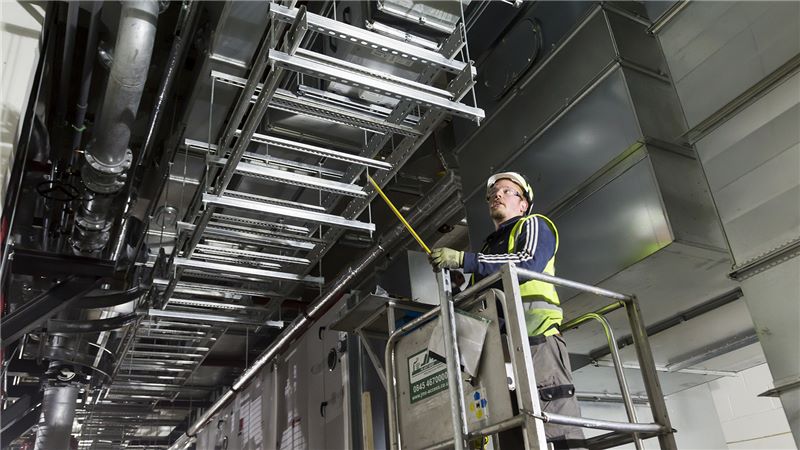We must embrace technology to avoid a cliff edge
The construction industry stands at a crossroads. We are quite simply not keeping up with the pace of technological change. Advancements in robotics and automated manufacturing, data analytics and virtual reality are radically transforming the sector and indeed the whole economy. Yet all is not lost.
The fourth industrial revolution – or Industry 4.0 – could improve productivity levels in construction, increase the number of highly skilled jobs and transform the way that we as a country deliver some of the biggest and most complex infrastructure projects of the future.
New advanced technologies will be integral to projects, such as Heathrow expansion, Crossrail 2 and Northern Powerhouse Rail, which are essential developments in bringing economic growth to the regions they serve and to rebalancing the UK economy. New and evolutionary infrastructure projects are vital to creating a favourable environment for investment, so important particularly in times of political and economic uncertainty. New construction technologies may also contribute to solving the housing crisis, which is arguably the single biggest social policy challenge facing the nation.
The UK has no choice but to adapt. A recent Construction Industry Trade Board report highlights how the construction workforce is likely to change. It suggests that to meet the expected output to 2021, the industry needs to recruit 5,240 employees every year in the occupation category defined as ‘non-construction professional, technical, IT and other office-based staff’. This annual recruitment rate is almost twice as many as any other job specification. It far outstrips the needs for plasterers, construction trades supervisors and even architects.
A new report published today by Mace - the British consultancy and construction company that I lead – supports this thesis. It highlights that as many as 600,000 construction sector jobs could be replaced by technology in the next two decades depending on speed of technological transformation. There would be significant reductions in the number of labourers, bricklayers, roofers and wood tradesmen across the nation as technology evolves, producing new jobs requiring new skills.
It is therefore crucial that the construction industry works to attract, retrain and upskill the current and future construction workforce in order to fill the jobs created by advanced technology. To avoid a cliff edge this training must start now, not in 5 or 10 years time.
In our report, we provide an ambitious plan to help create a workforce fit for the future. To begin with, the sector will need to embark on a large-scale, innovative training programme which starts in schools and goes right through to formal retraining. Engagement with new technologies must form a core part of the training programme and early use of ground-breaking technologies in schools should be promoted.
Early interaction with augmented and virtual reality, as well as 3D printing technologies will develop students understanding of new technology from a young age. ‘Construction Clubs’ in schools should further develop children’s skills and showcase construction as a rewarding career option.
Secondly, the non-academic routes through the post-16 education system are very important to the construction industry. These routes are currently undergoing significant reform from implementing a series of recommendations to technical education made by a panel led by Lord Sainsbury, to the current overhaul that is changing the apprenticeship system. On paper, these reforms are well thought through and make sense.
However, given the rate of innovation and technological advancement that is now happening, there is a question about how the content of any route through post-16 education can remain relevant. Both traditional apprenticeships and the design of the new trailblazer programmes need to incorporate the future need for a multi-skilled, adaptive workforce. The inevitable move to more modern methods of construction and off-site assembly must inform the design of course syllabuses now.
Thirdly, there needs to be greater provision for retraining and informing life decisions in all sectors. There should be increased focus on labour market intelligence which can inform construction firms how best to upskill their workforce to meet future technological changes.
This could include experimenting with the data that central Government collects. For example, HMRC payroll data could provide insights into how construction firms are managing their workforce, and aid the design of policy. It could also mean the commissioning of a large-scale annual survey that measures trends in construction innovation and technological advancement.
Industry 4.0 will transform the construction industry, providing greater levels of quality, precision and safety than ever before. New technologies and systems will drive innovation that will enable the sector to overcome its long-term productivity problem. If the construction sector is successful in evolving and adapting, the productivity boost could be worth an additional £25bn to the UK economy.
A thriving and modern construction sector is fundamental to the economy as a whole. Construction output in the UK is worth more than £110bn a year and contributes 7% of GDP. 3 million people are employed in the sector - 10% of total UK employment. Innovations in the sector will contribute to solving some of the biggest global challenges in the world, from designing smart cities and improving air quality levels to increasing energy efficiency in buildings and improving well-being with good quality design.
The construction industry is on the tipping-point of radical change. Instead of bemoaning the challenges that lie ahead, the sector must embrace the opportunities that technological advancements will offer. But we need to work in partnership with policymakers, education institutions and each other to ensure that the UK does not fall behind its international competitors. We can do this by harnessing our efforts to ensure that we have a highly-skilled workforce, ready to meet the new and exciting challenges that lie ahead.
Mark Reynolds is the Chief Executive of Mace and the skills lead for the Construction Leadership Council.
This article was originally published by the Daily Telegraph.
















